 |
 |
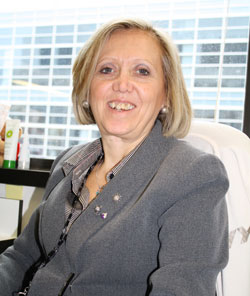
|
|
Ofelia Olivero, Medical Scientist (Cytogeneticist), Laboratory of Cancer Biology and Genetics, National Cancer Institute (NCI), National Institutes of Health (NIH)
|
1. I chose this career because....
2. My typical workday involves...
3. What I like best/least about my work...
4. My career goals are...
5. When I'm not working, I like to...
|
|
1. I chose this career because....
|
Back to Top

|
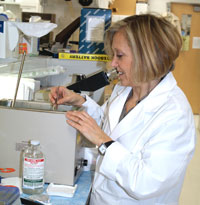
|
|
Ofelia retrieves test tubes incubating in a water bath.
|
I chose to become a medical scientist because I have been interested in the sciences since I was a young child. At the age of 11, my father gave me a microscope. It was an unbelievable experience. I discovered a world I had never seen before. I knew then, that I would pursue a career in the sciences.
I began my college studies with a focus in biological anthropology. After the first year, I switched to zoology because the science was more at a molecular level. Biological anthropology was oriented more towards the classification of animals. I knew I wanted a molecular career, because I always read a lot of books related to that subject.
At the end of my master’s degree, I joined a lab in a government institution, which opened doors of opportunity for me. Much of the research there was in the cytogenetics specialty. That experience was truly amazing. The institute was a pioneer in the sciences for that region, with laboratories having the latest technology and equipment. While there, I had access to a phase contrast microscope. It was wonderful. I was so happy looking at the cells. Since that time, my research has involved cytogenetics.
After graduating, I obtained a 4-year scholarship. During that time I conducted research for my thesis and dissertation. Once my formal education was complete, I continued working at the institute as a scientist. Then my supervisor helped me get a 1-year post-doctoral fellowship with NCI in the United States. I decided to stay a second year, and then a third year, and so on. Eventually my supervisor realized that I was going to stay with NCI.
My whole career has been at the NCI, where I have climbed the levels of seniority overtime.
First I was a visiting fellow, then a visiting associate, then a staff scientist. Now I am an associate scientist.
College Education
- Bachelor of Science, Natural History, Facultad de Ciencias Naturales y Museo (http://www.fcnym.unlp.edu.ar/, Argentina
- Master of Science, Zoology, Facultad de Ciencias Naturales y Museo, Argentina
- Doctor of Philosophy, Natural Sciences, Cytogenetics, Facultad de Ciencias Naturales y Museo, Argentina
|
|
2. My typical workday involves...
|
Back to Top

|
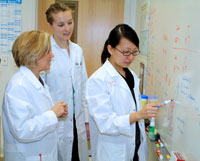
|
|
Ofelia and her mentees routinely meet at the white board to discuss research projects and to brainstorm new ideas.
|
My typical workday in the lab centers around current research projects. In the morning, I usually review and respond to my emails. I also attend to any situations that may need my immediate attention, such as a problem with an experiment.
Usually I have several students working with me in the lab. Sometimes we have a few summer high school students or a teacher from the HHMI-NIH Research Scholars Program (http://www.hhmi.org/science/cloister/program.html) or a post doctoral fellow. As a team, we often have brainstorm meetings at the white board. We mark up our ideas about experiments, solve problems and collaborate on how best to proceed. Since the students are here to gain real lab experience, I usually work closely with them the first time they run an experiment. I show them all the steps and help them to prepare the solutions and other materials for the experiment.
Besides working with my students on their research projects, I also design and execute my own experiments.
My Research: Effects of Novel Drug Therapies used for Acquired Immunodeficiency Syndrome (AIDS)
My research involves studying the carcinogenic (cancer causing) side effects of drugs used for the therapy of patients with Acquired Immunodeficiency Syndrome (commonly known as AIDS). AIDS is caused by the Human Immunodeficiency Virus (or HIV).
Our lab made the discovery that Azidothymidine (or AZT) –a drug that is commonly used for AIDS therapy– was carcinogenic. We found that pups born to mice that were exposed to AZT during pregnancy, developed multiple tumors by the end of their first year of life. Even with a short in utero exposure the offspring develop cancer. This is an event known as transplacental carcinogenesis, because cancer can develop later in life from drug exposure in the womb.
Since that discovery, we continue to study other drugs used for the therapy of AIDS. Usually people in therapy are taking a cocktail containing several different drugs.
Additional Roles
- Facilitator – I facilitate a seminar series held two days per week for approximately 100 members of our laboratory branch. Sometimes I invite speakers from outside organizations and sometimes I ask people from the lab to do a presentation. I have also helped to facilitate the start of a new training organization. It is a collaborative effort between staff scientists from NCI’s Center for Cancer Research (http://ccr.cancer.gov/) and those in the Office of Intramural Training and Education (http://www.training.nih.gov/). The goal of the organization is to expand the training opportunities for our scientists.
- Mentor – In addition to mentoring students and science teachers in my lab, I am part of the mentoring program for the Hispanics at NIH. I also act as a mentor for many other scientific organizations. Currently, I am working with others to develop a program that is aimed at helping Hispanic scientists when they first come here. We want to help them get established and teach them how to navigate the NIH.
- Lecturer – I sometimes present mini lectures to students that are visiting the National Library of Medicine, located here on the NIH campus. Usually they are advanced students who are already on a career path into science or medicine.
|
|
3. What I like best/least about my work...
|
Back to Top

|
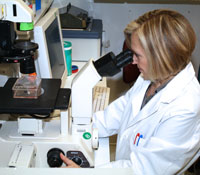
|
|
Ofelia looks at cancer cells under the microscope.
|
What I like best about my work is the discovery. At a recent training leadership group at NIH, we asked a group of scientists what they liked best about being in science. Many scientists said that it was publication. It is true that as scientists it is important to make new discoveries that can be published in peer-reviewed journals. But for me, discovery is more rewarding than publication.
What I like least about my work is the writing. It is always a challenge for me to write in the English language. However, writing (abstracts, reports, etc...) is an important part of the work I do, and so I continue to work on that skill.
|
|
4. My career goals are...
|
Back to Top

|
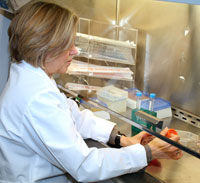
|
|
Ofelia takes care of her cell lines at a laminar flow hood, a device which creates a sterile barrier to help prevent bacteria and other contaminants from infecting the cells.
|
My career goals are currently focused on mentoring. Through my research, I feel that I have already made an impact in human health, and that makes me very happy and content. Now I want to mentor young students, in particular, young Hispanic women, and help them achieve their goals. Traditionally in our culture, young women had limited expectations about their career options. As a mentor, I want to inspire and support them to dream big and reach for their goals. I want them to know that anything is possible. They can have a satisfying career and a family life.
I enjoy talking to minority students, especially Hispanic females. I want them to be empowered, convey the message that there are other alternatives to careers than traditional pathways.
|
|
5. When I'm not working, I like to...
|
Back to Top

|
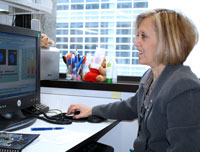
|
|
Ofelia works at her computer, analyzing data from her research projects on the cancer causing side effects of therapeutic drugs.
|
When I’m not working, I like to do yoga. I love to walk. I walk everyday and take long walks over the weekend. I love to cook and knit. I also enjoy communicating with my friends in Argentina and in other parts of the world.
|
|
|
|
 |